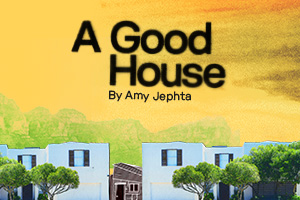A Good House at the Royal Court – review
The production, in association with the Market Theatre in Johannesburg, runs in London until 8 February and then at Bristol Old Vic from 14 February to 8 March

What is the true value of a house? What does it mean? What does it signify? What does it say about the people who inhabit it?
From Lorraine Hansberry’s A Raisin in the Sun to Bruce Norris’s Clybourne Park to Branden Jacobs-Jenkins’ Appropriate, the subject of property has proved rich terrain for drama that picks away at the strata of class, money and race in contemporary society. Now South African playwright Amy Jephta has added a sharply focused comedy to the canon.
In A Good House, a co-production between the Royal Court, Bristol Old Vic and Market Theatre of Johannesburg, Bonolo and Sihle are a well-off, assured, Black middle-class couple who have bought their dream home in the upmarket neighbourhood of Stillwater. They relish their new home, filling it with art and the accoutrements of comfortable living, like a vintage cheese knife and a wine aerator they bought in Sicily.
When their neighbours, a white, middle-aged couple, Christopher (buff Scott Sparrow) and Lynette (Olivia Darnley) finally come round for drinks, they are clearly uncomfortable – not only because Bonolo and Sihle are clearly not what they expected, but also because they have an ulterior motive for their visit. An unauthorised shack has appeared on a vacant plot, and they want to improve “the optics” of issuing an eviction order by enlisting their Black neighbours to sign their names.
Another couple, Andrew (Kai Luke Brummer) and Jess (Robyn Rainsford) overlook the structure; he’s an anxious, failing restauranteur, she’s a yoga instructor. Their first meeting with Bonolo and Sihle is a masterpiece of comic embarrassment when Andrew assumes they live in the shack – and Jess squirms with shame at his overt racism.
Yet racism, prejudice and the difficulties of a truly multi-racial society fill every scene, causing discomfort on every side. Class and wealth complicate the picture. Christopher may misunderstand him when he says he works in security, but it’s clear that Sihle, given both dignity and a compulsive desire to please by a wonderfully warm performance from Sifiso Mazibuko, is both the richest of the men (he is a securities trader) and the one from a truly poor background.
Yet his initial instinct to conform, to let the prejudice of his neighbours wash off him, is challenged by his wife, played with beady wariness by Mimi M Khayisa, who is much more performatively an activist, keen to stress her township roots, but who – as her husband points out – never left her suburban home “except for your annual vacation to Perth.”
As they laugh, argue, and shift ground, they fall into reveries and conversations in dreamlike sequences that punctuate the action, giving access to their inner thinking that is not extended to the white characters. At two key moments, Sihle speaks Zulu – a language Bonolo does not understand.

The entire play, keenly directed by Nancy Medina, is fast-moving and very funny, puncturing assumptions and attitudes with swift and searing observation. But it also teeters on the edge of something unreal; on Ultz’s set, defined by a square of light on the floor, each couple sets up the furniture of their homes, pulling their differing lives and aspirations into place.
The shack is revealed by screens sliding away from the back; it is solid but also alters according to each character’s description of it. Its inhabitants – presumed to be poor and Black and a threat to property prices – remain invisible. It is both a real thing, and a representation of something in each character’s mind. Its presence represents a challenge to the setting of shared values, and asks the question of what is a community – and what is the true price of fitting in.
On the opening night of A Good House, the Royal Court’s artistic director David Byrne paid tribute to the late Joan Plowright, founder member of the English Stage Company that made the theatre a watchword for great, challenging, contemporary writing. In its confident social comedy and defiantly difficult dilemmas, A Good House very much belongs on its illustrious stage.



















